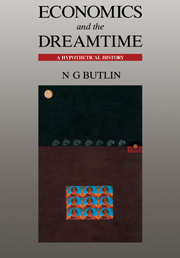Book contents
- Frontmatter
- Contents
- Preface
- Acknowledgements
- Figures
- Maps
- Tables
- Introduction
- Part I The palaeoeconomic history of Aboriginal migration
- Part II Development, structure and function of Aboriginal economy
- Part III Disease, economics and demography
- Part IV The establishment of a bridgehead economy: 1788–1810
- Part V The takeover process: 1788–1850
- 19 Introduction
- 20 British development in the long run
- 21 The hunter gatherers of empire
- 22 British, American and Macassan presence in the takeover
- 23 The major players
- 24 Aborigines and British law
- 25 The economics of takeover
- 26 The composition and demographic impact of disease
- 27 The interaction of disease with resistance, integration and submission
- 28 Conclusions
- Bibliography
- Appendix 1 Preliminary model/checklist of Aboriginal migration to Australia
- Appendix 2 NOAA depth contour maps
- Index
21 - The hunter gatherers of empire
Published online by Cambridge University Press: 06 July 2010
- Frontmatter
- Contents
- Preface
- Acknowledgements
- Figures
- Maps
- Tables
- Introduction
- Part I The palaeoeconomic history of Aboriginal migration
- Part II Development, structure and function of Aboriginal economy
- Part III Disease, economics and demography
- Part IV The establishment of a bridgehead economy: 1788–1810
- Part V The takeover process: 1788–1850
- 19 Introduction
- 20 British development in the long run
- 21 The hunter gatherers of empire
- 22 British, American and Macassan presence in the takeover
- 23 The major players
- 24 Aborigines and British law
- 25 The economics of takeover
- 26 The composition and demographic impact of disease
- 27 The interaction of disease with resistance, integration and submission
- 28 Conclusions
- Bibliography
- Appendix 1 Preliminary model/checklist of Aboriginal migration to Australia
- Appendix 2 NOAA depth contour maps
- Index
Summary
From the fifteenth century, European maritime technology responded to these pressures and opportunities. Improved ship-building construction and the development of the astrolabe, the compass and mapping methods were all vital to this belated European response to leave the land and attempt ocean travel, a feat that Aborigines had, with inferior technology, achieved tens of thousands of years earlier, as had the Chinese with superior technology. First the Spanish and Portuguese, then the Dutch and finally the British and French developed into major imperial powers, hunting and gathering under their control vast areas of the rest of the world. If the original object was to respond to the increased costs of trade in and via the Mediterranean in order to seek the highly prized and largely luxury goods of the East, found benefits on the way progressively altered imperial and trading ambitions. Trading objectives on this scale and with this order of risk were not easily achievable by individuals. State-directed and supported corporations were crucial instruments and trade and imperial interests became closely intertwined. National and corporate action, individual trading, naval operations and piracy became components of a complex imperial and trading play with fine gradations separating them. In the course of 300 years after 1500, the five nation states of Europe competed for and, in varying ways, dominated most of the nations outside Europe.
- Type
- Chapter
- Information
- Economics and the DreamtimeA Hypothetical History, pp. 190 - 195Publisher: Cambridge University PressPrint publication year: 1993



